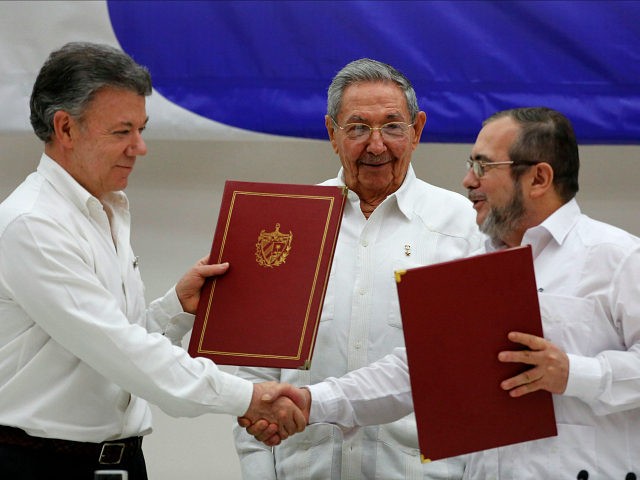Colombia has agreed on a deal to reintegrate the guerrilla population of the Revolutionary Armed Forces of Colombia (FARC), the world’s wealthiest non-jihadist terrorist group, into Colombia’s civilian communities, a move President Juan Manuel Santos claims marks a definitive end to the half-century-long war between the government and the FARC.
This is the second major announcement of a “peace deal” with the FARC in Santos’s tenure, the first made in Havana in September in a ceremony attended by Cuban dictator Raúl Castro. In that announcement, Santos noted that only the roughest outlines of a deal had been agreed upon, and a full deal to disarm the terrorist organization would require months of negotiations.
On Thursday, Santos said much of the same: that further negotiations are necessary, but a plan is in place to reintegrate the FARC into civilian life. “After more than fifty years of confrontations, death, attacks, and pain, we have put a final end to the armed conflict with the FARC,” he said in a nationally televised speech. “We have not only agreed upon an end to confrontations – with a definitive and bilateral ceasefire – but we have also defined a precise chronology for the FARC to forever lay down there arms,” he noted. “This marks nothing more or less than the end of the FARC as an armed group.”
Santos did not note in his speech that no date has been set for the implementation of this plan, and the Revolutionary Armed Forces of Colombia can walk it back whenever they choose. He later noted that there is hope the agreement will be signed by the end of July. The last such deadline — for the agreement announced this week — was March 23.
The BBC details the specifics of the deal, should it ever be implemented:
- A commitment that rebels will lay down arms within 180 days of a final peace deal
- The creation of temporary transition zones and camps for the estimated 7,000 rebels
- A provision that no civilians will be allowed to enter Farc camps, to guarantee rebel security
- A provision that UN monitors will receive all the group’s weapons
The “transition zones and camps” will be spread throughout the country, designed to avoid urban areas. There will be 23 municipalities taking in FARC terrorists, who will have 180 days since moving into these zones to hand over all their weapons. Authorities have designated a one-kilometer area between the zones and government borders as a no man’s land for either FARC terrorists or police, to be controlled by civilian officials. Colombian newspaper El Tiempo does note that FARC terrorists straying from the 23 designated areas armed will not be granted immunity from arrest.
Surveys following the initial announcement of a deal with the FARC indicate that Colombians are uneasy about having terrorists return to civilian life as their neighbors. A poll by Colombian Eafit University’s Center for Political Analysis released in October found that half of those surveyed would not be willing to live next to a FARC terrorist.
Statements following the announcement this week indicate they have reason to be uneasy. The FARC have not committed to peace, despite Santos’s proclamation. “We have ample information that they are prepared to return to war and urban war, which is much more destructive than rural war,” Santos said this week. He argued that this threat was more of a reason to engage in peace talks with the FARC.
FARC terrorists interviewed in the Miami Herald believe that the peace deal will make the narco-terror group stronger. “The reality is that the [government] was never able to defeat us and that’s why this process isn’t about us capitulating,” one guerrilla member told the newspaper. “We’re talking about mobilizing toward politics. We’re going to make the transition from a political-military organization to a political organization,” another argued.
Álvaro Uribe, a senator and former president responsible for significantly reducing the operative capabilities of the group in the 2000s, issued a statement lamenting the deal, arguing that it is a gross injustice for the deal to permit FARC terrorists to return to civilian life without facing legal repercussions. “The word ‘peace’ is hurt by not demanding the FARC, the world’s third-wealthiest terrorist group, pay reparations to its victims, money which, in saving it, will allow them to buy all the weapons they need to replace those they give up,” he argued. Uribe also condemned hosting the negotiations in Cuba and legitimizing the Castro regime, as well as permitting FARC leaders in particular to avoid consequences both for violent crimes likes murder, kidnapping, rape, and forced abortions, as well as drug-related offenses.

COMMENTS
Please let us know if you're having issues with commenting.